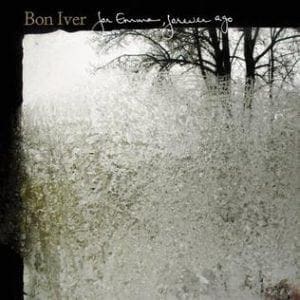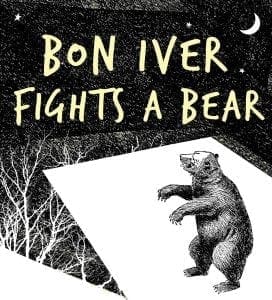Revisiting Bon Iver’s For Emma, Forever Ago. With a Bear.
This my excavation
In 2006, musician Justin Vernon left North Carolina after two breakups: with his band and longtime girlfriend. Broke, heartbroken, he drove back to his home state of Wisconsin and spent a cold autumn and winter in his father’s hunting cabin. There he cut wood, drank, and wrote and recorded one of the finest, most emotionally moving, rawly authentic albums of this young millenium.
That’s the story.
 It’s one that playwright Doug Williams and director Maura Krause wanted to explore and flip over. “We’re both music obsessives, and the story behind Bon Iver’s first album is a modern music legend,” says Williams. “But there are larger questions about the ‘broken male genius’ that feel really primed to be pushed back upon right now.”
It’s one that playwright Doug Williams and director Maura Krause wanted to explore and flip over. “We’re both music obsessives, and the story behind Bon Iver’s first album is a modern music legend,” says Williams. “But there are larger questions about the ‘broken male genius’ that feel really primed to be pushed back upon right now.”
These questions get a outlandish treatment in the pair’s world premiere Fringe Festival show, Bon Iver Fights A Bear, which opens tomorrow. “We figured, if we’re really trying to tell this story in the most outrageous way possible, we gotta have this talking bear narrate it and sort of call bullshit on the mythology of the whole thing,” says Williams.
“We want to explore the ways in which we romanticize the story of the white-male-genius-type that retreats to the woods to get over his heartbreak,” adds performer Emily Schuman, who plays Bon Iver, hipster beard and all. (The moniker was taken from French for “happy winter,” a repeated greeting in cult TV show Northern Exposure.) “Really, he was just a 24-year-old kid who was trying to figure himself out but ended up doing something incredibly honest.”
So many foreign worlds, so relatively fucked
It’s been ten years since the major label issue of For Emma, Forever Ago. The cultural backdrop of its release reminds us how long ago that was: After self-printing 500 CDs, Vernon saw the record gain momentum on the back of plays on MySpace and a celebratory review on Pitchfork. CDs. MySpace. Pitchfork. Even the recent past is a foreign country.
Combining simple folk strummings of acoustic guitar with intelligent use of technology, the album launched Vernon’s career beyond heights he might’ve imagined with his folk rock bands. He was given a Grammy for it in the guise of awarding his 2012 follow-up Bon Iver, Bon Iver (you know how award shows do) and was certified platinum on the back of huge vinyl sales.
Sung in falsetto, its lyrics are mostly incomprehensible, but always evocative; self-critical rather than self-piteous. Dominated by simple guitar strumming, the music is simple—sometimes deceptively so (as when “For Emma” resolves in a lesser-used key-of-C progression from the Em III chord to the C I chord), sometimes plainly so (the three-note slide guitar in the same song). Its sound presaged a folk revival—Fleet Foxes, Mumford and Sons—and influenced artists from the heights of the singer-songwriter genre (Vernon’s labelmate Sharon Van Etten) to its depths (Ed Sheeran has a tattoo of lyrics from “Re: Stacks” on his arm).
Vernon’s vocals are elaborately overdubbed and multi-tracked, and tweaked with a then-innovative use of auto-tune as a tool to refine the emotional impact of their delivery. It’s a technique which tied him to the major pop presence of the decade, Kanye West, with whom he subsequently collaborated on multiple tracks. But if Kanye’s cultural impact has undergone revisionism with his public support for racist political figures and marriage to a reality TV star, Vernon’s legacy is relatively unchallenged. Certainly not by adding a judgmental bear to a lighthearted retelling of the creation of his breakthrough album.
So Apropros
FringeArts spoke to playwright Doug Williams and musician Emily Schuman about the album, its legacy, and their Fringetastic exploration of its creative genesis. (Below.)
 FringeArts: Do you remember where you were when you first heard For Emma Forever Ago? What was your initial reaction and early reaction?
FringeArts: Do you remember where you were when you first heard For Emma Forever Ago? What was your initial reaction and early reaction?
Emily Schuman: I was definitely in high school and I remember how this album fed my emotional, nostalgic needs. Even though his lyrics weren’t decipherable, my teenage angsty self couldn’t get enough of his sorrowful falsetto voice that seemed to speak directly to my soul.
Doug Williams: When I was a senior at Temple a woman that I was close with, in that dreamy romantic way where you’re not dating but you also are kind of in love with each other, emailed me two songs, one was Beirut’s “Postcards From Italy” and the other was “Skinny Love”. I think liked the Beirut song more at the time because Bon Iver’s sound was so odd. There was a kind of darkness and anger to it that took me a while to open up to. Of course, those rough edges and dark corners are what I really love about Bon Iver’s work now. The complexity in Justin Vernon’s sound and his lyrics.
FringeArts: Did you know the story of the album then?
Doug Williams: I didn’t have the context of the story when I first heard the song, which really did elevate the album for me in certain ways when I first learned how the music was made. I was just about to graduate from college with a film degree, but was increasingly drawn to writing plays instead of screenplays. My artistic process was completely changing and there was something so incredibly interesting (verging on annoyingly romantic?) about the way Vernon sequestered himself to make a complete piece of art. The album and the story all kind of hit me at this perfect time, when I was trying to explore new mediums in different ways.
FringeArts: Looking back, what do you think now of the early press and response to the album and the story of its creation?
Doug Williams: Well I mean it sort of took over the whole narrative of the album. Context is super important to some people and I think with this album specifically, it was hard for people to separate the music from the narrative of how it was made. It’s not a bad thing necessarily, I mean in a lot of ways the legend of this album’s creation is what allowed Bon Iver to flourish and have the career he’s had. Looking back there’s also the fact that Vernon writing in seclusion equaled genius for some, while other artists like Fiona Apple or Ms. Lauryn Hill have created work in a similar fashion and been labeled mentally unstable. That’s something we’re really trying to unpack and examine with this play.
Emily Schuman: I think it shows how much we were drawn to narrative in our folk music. We wanted more layers of story to add to our listening experience. Even though Justin Vernon has rejected multiple times in interviews the notion that For Emma was a heartbreak album about his ex-girlfriend, I will always remember sharing the album with my friends saying “Have you heard about Bon Iver? It’s this guy who escaped to the woods to write about his break-up, so romantic right?” Telling that story added a sense of urgency to the listening experience, something to search for and uncover.
Doug Williams: Another interesting thing to me is that he’s actually transcended the legend. His body of work and his sound have evolved so much. He’s worked with Kanye, Lizzo, Chance the Rapper—it really sort of blows my mind that he was able to get out from under this narrative, it really could have been a brand that stuck with him his entire career.
It’s also just such a fucking great story. It really makes sense why it blew up. As overblown as the whole thing is (which Justin himself has admitted to basically every time he asked about it) it’s just such a fucking great story. Being alone through a whole winter with nothing but a computer and a guitar and making an album that completely explodes for people? That’s a great story.
It also in a weird way says a lot about marking art and about where we are with technology. Like, he just did that. Completely on his own. With nothing. I don’t know, it’s a story that still really resonates for me, as cheesy as it is.
FringeArts: What did you want to do with Bon Iver Fights A Bear? Why now?
 Doug Williams: Well it’s been an idea that has been rattling around in my head for a while. And this past year was the 10th anniversary of the album’s release so seeing a lot of press about it kind of reignited the whole thing in my brain.
Doug Williams: Well it’s been an idea that has been rattling around in my head for a while. And this past year was the 10th anniversary of the album’s release so seeing a lot of press about it kind of reignited the whole thing in my brain.
Emily Schuman: We want to explore the ways in which we romanticize the story of the white-male-genius-type that retreats to the woods to get over his heartbreak, when really, he was just a 24-year-old kid who was trying to figure himself out but ended up doing something incredibly honest and wound up with an awesome new sound. We want to see what happens when we take Justin Vernon seriously, ditch the irony and critique the ways in which he has been perceived. In an era where the concept of truth is literally upended, we owe it to ourselves and our communities to make art that is genuine, honest and true.
Doug Williams: Yeah, there are larger questions about examining the broken male genius that feel really primed to be pushed back upon right now. It’s also a fun opportunity to take a modern myth, put it on stage and inject some humor and some magic into it. Anyone who’s heard the story of this album probably has some specific image in their head of what happened that winter. We’re excited to put our own stamp on it with a weird outrageous play about a talking bear. To come at it from a completely different angle.
FringeArts: What do you think of the album these days?
Emily Schuman: I feel like For Emma still lives in my high school brain. It was right when I started developing my own taste in music. It feels like the beginning. What’s amazing is that as soon as I put it on, all those feelings come back. I can still hear how new his sound was. But listening to his newer albums, you can so clearly tell how far he has come in developing his sound. It’s like the Harry Potter books: each one is more mature than the last and you feel like you are growing with him.
Doug Williams: I mean I love this album. Which is something that’s been really interesting in making this play. We’re trying to challenge this whole narrative, the archetype of the broken male genius, challenge the idea of Justin Vernon and also actually really honor the work and the magic that went into creating this music. It’s a tricky balancing act that we’ve all been figuring out as we go along.
FringeArts: What endures about it to you? What feels dated?
Doug Williams: The sound of the album itself is what really endures for me. The cold haunting of it. The song “Re: Stacks” feels super important to me. All that being said, the sound itself I think is what is the most dated, especially in terms of Bon Iver’s body of work.
Along with Bon Iver, Kanye West is another one of my all time favorite artists and I think there are so many parallels between them, the most important in my opinion being their pursuit of a completely new identity and sound on every new record. As much as I’m down with a band like Beach House, when they come out with a new album, you sorta know what you’re gonna get. But going back to listen to For Emma, and then listening to his new album 22, A Million, it’s like a completely different artist. That takes real bravery as an artist, not to just ride the wave you’ve already found success on and in a way adds to the whole mystery of how Vernon creates his music. I could sort of keep writing this play forever, there’s just so much more I want to explore. Like I want Kanye to be a part of it somehow, I just gotta figure out how to do that…
FringeArts: Thanks Doug, thanks Emily.
—Christopher Munden
What: Bon Iver Fights A Bear
When: September 7-17, 2018
Where: Art Church of West Philadelphia, 5219 Webster Street
Cost: $15
Created by Doug Williams and Maura Krause (and Bon Iver)
fringearts.com/event/bon-iver-fights-a-bear


